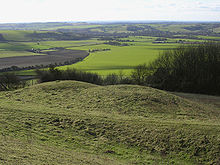- Meonwara
-
Meonwara or Meonsæte is the name of a people of probable Jutish origin who colonised what is now known as the Meon Valley, an area in southern Hampshire, England, during the late 5th century and early 6th century.[1]
Contents
Area of settlement
See also: Kings of the Isle of WightThe land that the Meonwara Jutes settled was the valley of the River Meon and also part of southern Hampshire across the Solent from the Isle of Wight[1]
Sources
The Anglo Saxon Chronicle records a series of landings between 449 and 514CE of Anglo Saxon people in this area.[2] While the identity of those in the later landings are described as "West Saxons" those in the earlier landings are without description and generally considered to be the Jutes. According to the Anglo-Saxon Chronicle the founders of Meonwara were Port and his two sons Bieda and Maegla.[3] These were later followed by Wihtgar and his brother Stuf who are said to have colonised the Isle of Wight (the name Wight derived from Wihtgar).[3][4][5]
The Anglo Saxon Chronicle gives a brief description of the Jutes who lived in southern Wessex:
"From the Jutes are descended the men of Kent, the Wightwarians (that is, the tribe that now dwelleth in the Isle of Wight), and that kindred in Wessex that men yet call the kindred of the Jutes.[5]
Another source of information comes from Historia ecclesiastica gentis Anglorum by Bede:
"The Jutes are descended the people of Kent and the Isle of Wight and those in the province of the West Saxons opposite the Isle of Wight who are called Jutes to this day."[6]
Archaeological findings have uncovered evidence, in the valley of the River Hamble and elsewhere, that these early colonists were probably Jutes, and not Saxons.[7]
Notes
- ^ a b Smith. Memorials of Old Hampshire:The Jutish Settlements of the Meon Valley. p.39
- ^ ASC Parker MS: AD449, AD455, AD477, AD495, AD501, AD514
- ^ a b Jones.The End of Roman Britain. p.71. - ..the repetitious entries for invading ships in the Chronicle (three ships of Hengest and Horsa; three ships of Aella; five ships of Cerdic and Cynric; two ships of Port; three ships of Stuf and Wihtgar), drawn from preliterate traditions including bogus eponyms and duplications, might be considered a poetic convention.
- ^ Yorke.Kings and Kingdoms p.27
- ^ a b ASC Parker 449
- ^ Bede.HE.1.15.
- ^ Lapidge. Anglo-Saxon England, Volume 20 . p.15
References
 s:Anglo-Saxon Chronicle. Commissioned in the reign of Alfred the Great
s:Anglo-Saxon Chronicle. Commissioned in the reign of Alfred the Great- Bede.
 s:Ecclesiastical History of the English People.. Translation based on L.C. Jane (1903); A. M. Sellar (1907).
s:Ecclesiastical History of the English People.. Translation based on L.C. Jane (1903); A. M. Sellar (1907). - Jones, Michael E. (1998). The End of Roman Britain. Ithaca, NY: Cornell University Press. ISBN 9780801485305.
- Lapidge, Michael (2009). Anglo-Saxon England Vol.20. Trowbridge: Cambridge University Press. ISBN 052141380X.
- Smith, L. (2009). G.E.Jeans. ed. Memorials of Old Hampshire: The Jutish Settlements of the Meon Valley. London: BiblioBazaar. ISBN 1113823445.
- Yorke, Barbara (1997). Kings and Kingdoms of Anglo-Saxon England. London: Routledge. ISBN 041516639x.
The Heptarchy Kingdoms Lesser kingdoms Ynys Weith (Isle of Wight) · Meonwara · Surrey · Iclingas · Lindsey · Hwicce · Magonsæte · Pencersæte · Pecsæte · Wreocensæte · Tomsæte · Haestingas · Middle Angles · Kernow (Cornwall) · Gyrwas · Southumbrians
Minor Anglo-Saxon
tribes and fiefsÆlfingas · Æbbingas · Godhelmingas · Arosæte · Beormingas · Bilsæte · Duddensæte · Cilternsæte · Eorlingas · Husmerae · Gaini · Sunningas · Brycgstowl · Icelingas · Banesbyrig · Lindisfaras · Woccingas · Nox-gaga and Oht-gaga · Middle Saxons · Middle Angles · North Mercians · Duddaæte · Gyrwas · Tetingas · Basingas · Snotingas · Spaldingas · Stoppingas · Sweordora · Westerne · Elmetsæte · Gewisse · Readingas · Weorgoran · Somersæte · Sumortūnsǣte and Glestinga · Sumorsǣte · Glastening
Wikimedia Foundation. 2010.

